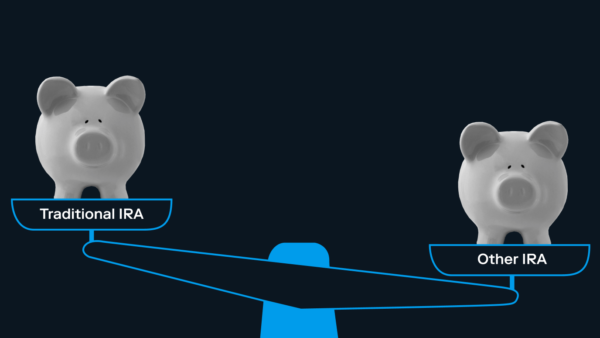Nov 7, 2023
What is a Brokerage Account, and How Do I Open One?

Planning for the future isn’t just about determining what city you want to live in, how many children you want to have, or how to pursue your dream career; it’s also about preparing financially for these life events. Aside from saving and paying down debt, investments are the best way to set yourself up financially.
| One of the primary ways to invest is through a brokerage account, which is a taxable investment account set up through a licensed brokerage firm. The purpose of the account is to use deposited funds to buy and sell securities such as stocks, bonds, mutual funds, and exchange-traded funds (ETFs). |
Having a brokerage account is the first step to building your investment portfolio. If you want to save up for college, retirement, or large purchases, a brokerage account is a good way to work toward these goals.
In this article, we’ll cover the following:
- Types of brokerage accounts
- The pros of brokerage accounts
- The cons of brokerage accounts
- How to choose a brokerage firm
- How to open a brokerage account
- The difference between a brokerage account and other investment accounts
Types of brokerage accounts
There are two main types of brokerage accounts: cash brokerage accounts and margin accounts. The primary difference between the two is how they are funded and the risk associated with each type of account.
- Cash accounts: A cash account is funded by the cash you have in your account. Investment purchases are based on and limited to the money in the account, so if you have $2,500 in cash, investments are limited to that amount. The upside of this type of account is that it presents less risk to the investor, but the downside is that borrowing funds is not permitted, and returns are smaller.
- Margin accounts: A margin account allows you to borrow funds from the brokerage firm you opened your account with to purchase investments—the investments you purchase become collateral for the loaned money. The upside of this type of account is that you can utilize more complex trading strategies, purchase more investments, and have the potential for greater returns. The downside to this account is that it presents a higher risk; you’re responsible for paying interest on the loan, and the brokerage firm can sell any of your investments to cover an account deficit.
Within the category of cash or margin accounts, you have subcategory options to consider. These subcategories may determine what type of financial guidance you will receive for your brokerage account investments or where you will ultimately open your account.
- Online brokerage accounts: An online brokerage account is opened and managed from a website or mobile app. These accounts are best for those comfortable with financial planning, strategizing, selecting investments, and executing trades independently. However, most online brokerages have research and analysis tools to help inform decision-making. One of the benefits of online brokerage accounts is that fees may be less, with many charging a small per-transaction commission or no commission at all.
- Discount brokerage accounts: A discount brokerage account is a less hands-on investment approach. These firms tend to charge lower fees because they don’t provide as many services as a full-service firm. The benefit of a discount brokerage account is that you still have access to real-life brokers who may provide services that are helpful to investment decision-making.
- Robo-advisor accounts: a robo-advisor account has an algorithm, not the investor, select the investments without any human participation. However, investments with robo-advisors are typically restricted to ETFs or mutual funds. Costs for asset management are lower compared to full-service brokerage firms, and minimum balance requirements can sometimes be as low as $0.
The pros of brokerage accounts
Easy to open
Brokerage accounts can be opened in just a few simple steps, taking only minutes of your time. Depending on the brokerage firm and type of account you select, you may not even have to leave the comfort of your own home or have a minimum balance to start. All you need to provide is some personal information, and you’re on your way to building your investment portfolio.
Diversification
Brokerage accounts allow you to diversify your portfolio by investing in a mix of securities and buying in various industries and locations. Diversification can reduce risk and even mitigate the negative impact of market highs and lows.
Many brokerage firms are registered with the Securities and Exchange Commission (SEC) through the Securities Investor Protection Corporation (SIPC), which means their accounts are typically insured for up to $500,000 should the brokerage fail. Half the insured amount can cover cash, but insurance does not cover investment losses.
Nearly liquid
While funds in a brokerage account aren’t as easy to access as a checking account, you can withdraw cash at any time without penalty. However, keep in mind that cashing out investments does trigger capital gains taxes. Brokerage account funds are more accessible than other investment accounts, like 403(b)s, 401(k)s, or IRAs, which can trigger income taxes plus incur a 10% penalty if withdrawn before age 59.5.
No contribution limits or required minimum distributions
Unlike retirement accounts, brokerage accounts don’t have contribution limits, so you can put as much funds as you want in the account. Brokerage accounts don’t require minimum distributions, which would cause the investor to pay income tax on the money or be taxed 50% for failing to withdraw.
The cons of brokerage accounts
Risk
While many brokerage firms insure their accounts for up to $500,000, that insurance does not cover investment losses. Purchasing any investment involves some level of risk. Some are higher than others, so you will need to balance between safer investments that provide lower returns and riskier investments that have the potential to produce bigger gains.
Taxes
Brokerage accounts typically tax on earnings when realized, so usually when a dividend is paid, or an asset is sold. There are other types of investment accounts, like retirement accounts, that don’t tax deposits. However, those accounts do require distributions to be taken in retirement, which are taxed.
Fees
Depending on the brokerage firm, you will likely incur fees for their services, including managing your investments. Fees can include account maintenance, advisory, annual, and purchasing/selling investment fees. The cost of the fees varies from provider to provider. Typically, full-service firms have higher fees, and online brokerages have lower fees.
Minimum deposit and balance requirements
Most brokerage firms will require a certain amount when opening a brokerage account, referred to as a minimum deposit. You may be able to avoid the minimum deposit if you go with a robo-advisor account; some don’t have this requirement. In addition to minimum deposits, many accounts require a certain balance to avoid penalties. Balance requirements affect how much money you can withdraw from the account at any given time.
How to choose a brokerage firm
Many types of brokerage account providers exist, from traditional brokerage firms to app-based or online brokerages. Your financial needs will help determine where to open your brokerage account.
To make an informed decision on a brokerage firm, here are four factors to consider:
- Financial advice: The level of guidance you need or desire will play an integral part in deciding where to open a brokerage account. Full-service firms actively manage brokerage accounts, providing expert advice on financial planning, investment strategy, and more. Online brokerages are a little less hands-on but offer Robo-advisors who can match you with investment options based on your goals and risk profile.
- Investment options: What you would like to invest in can help narrow the list of brokerage firms based on what they offer. While most will provide stocks, bonds, and varied funds, some offer cryptocurrency, real estate, currency, and commodities.
- Fees: All brokerage firms charge fees to open an account, but the amount of the fees varies from provider to provider. Typically, the more involved they are in managing your account, the higher the fees will be. Therefore, online or app-based brokerages with robo-advisors charge comparatively less.
- Minimum balance: Brokerage firms may require a minimum amount of funds to open an account, and some may require the account to be maintained with a certain balance. What those minimum balances are will vary from provider to provider.
Key points about brokerage firms:
- Financial and investment needs will help determine what brokerage firm suits those needs.
- Full-service firms may charge through commissions on trades or with a flat fee
- Full-service brokerage firms may charge higher fees, but they provide advisory services.
- Online brokerages offer lower fees if you prefer to do your own research, trades, and account transactions.
- Online brokerages offer the convenience of 24/7 access to your account.
- Robo-advisors provide services using algorithms, such as planning, investing, and portfolio management.
How to open a brokerage account
After you’ve selected a brokerage provider, the process of opening a brokerage account is completed in a few easy steps. Whether opening an account in person or online, you’ll need to provide the type of account you want to open, some personal information, and answer questions about your financial needs and investment preferences.
Brokerage firms require specific personal information from investors to comply with federal and state laws and regulations.
If you’re unsure what you need to provide, here is the information to have ready when opening your brokerage account:
- Your legal name
- Social security number (SSN) or tax identification number (TIN)
- Driver’s license, passport, or government-issued photo ID
- Physical address/phone number/email address
- Employment information
- Financial data (annual income, net worth, investment objectives, risk tolerance)
Once your account is open and your profile created, you must fund your account with at least the minimum deposit required.
The difference between a brokerage account and other investment accounts
There are quite a few differences between a brokerage account and other investment accounts, including investment type, income limits, contribution limits, investment options, and tax advantages.
Brokerage accounts vs. savings accounts
While savings accounts can accrue interest the longer funds stay in the account untouched, they differ in three key ways from brokerage accounts.
- Risk: Savings accounts are Federal Deposit Insurance Corporation (FDIC) insured, and no investments with potential losses are made through the account, so they present less risk.
- Returns: Savings accounts accrue interest at whatever rate the financial institution offers. Brokerage accounts use funds to purchase securities that have the potential to increase value and earn dividends, allowing for bigger gains.
- Purpose: Savings accounts are typically used for short-term financial goals, while brokerage accounts are for mid-to-long-term goals.
Brokerage accounts vs. retirement accounts
Retirement accounts include Roth accounts, individual retirement accounts (IRAs), and 401(K)s are different types of investment accounts with different criteria and functions than brokerage accounts.
- Access: Retirement accounts have strict mandates on how to invest your money and when you have access to those funds. Brokerage accounts allow for total control over the amount you invest, the securities you invest in, and the withdrawal of funds.
- Purpose: Retirement accounts are long-term only, requiring the account holder to be at least 59.5 to access their funds without penalty. Brokerage accounts allow you access whenever without penalty, making it more suitable for mid- and long-term financial goals.
- Contributions: Certain retirement accounts, like 401(k)s and IRAs, allow your employer to match contributions to the account. The investor entirely funds brokerage accounts.
- Tax advantages: If account holders stick to the rules for accessing retirement accounts, they have the potential to pay less taxes. Brokerage accounts don’t provide any tax advantages, but they do have the potential to help pay a lower capital gains rate when selling securities.
Brokerage accounts Retirement Accounts Investment type For mid- to-long-term goals (5+ years away but sooner than retirement) For long-term retirement savings Income limits No income limits
Income limits may apply (varies by account type)
Contribution limits No contribution limits Annual contribution limits (varies by account type) Investment options Wide variety of investment options
Restricted investment options
Tax advantages No tax advantages
Potential tax advantages
Ready to invest in your future?
If you want to invest in stocks, bonds, and other securities, a brokerage account is essential. Licensed brokerage firms like Stash can help you open and maintain a brokerage account that serves your mid- to-long-term financial plans. Whether you’re working toward goals six, fifteen, or thirty years down the road, establishing a brokerage account is the first step toward building a healthy, diversified portfolio.

Investing made easy.
Start today with any dollar amount.

Related Articles

15 Largest AI Companies in 2024

The 12 Largest Cannabis Companies in 2024

What Is a Traditional IRA?

Saving vs. Investing: 2 Ways to Reach Your Financial Goals

How To Invest in the S&P 500: A Beginner’s Guide for 2024

Stock Market Holidays 2024





